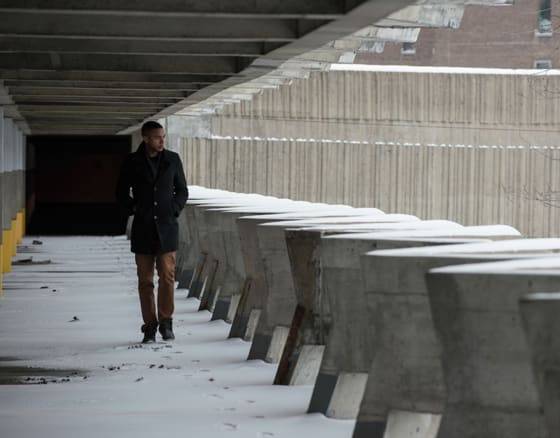Finally, a pivotal, long-obfuscated moment in the history of Montreal race relations gets the documentary treatment. As a Concordia alumnus who began his undergraduate studies the week of the infamous "Netanyahu Riot," the 1969 Computer Riot was an oft-mentioned but little-taught example of my alma mater's tradition of grassroots activism. It's also a very damning stain on the track record of a city that, just a year before securing the rights to the 1976 Summer Olympics and only months after hosting one of the 20th century's most successful world fairs, proved it fell way short of the remarkable bastion of inclusion and multiculturalism it aspired to be.
Filmmaker Mina Shum (Double Happiness) revisits this pernicious slice of institutional racism in the NFB-produced Ninth Floor, weaving together downright infuriating archival footage of administrative apathy with innovatively eerie, interrogation-themed interview set-ups with most of the impacted students. In February 1968, years before Sir George Williams University would merge with Loyola to become Concordia, six Caribbean students filed a simple grievance against their biology professor, alleging he was systematically giving them lower grades than their white peers for identical lab work. The university administration's mind-boggling inadequacy in addressing the matter saw it first escalate into a peaceful occupation of the Hall building's ninth floor computer centre the following winter. Then, days later and in a frankly baffling turn of events, Montreal riot police stormed the occupied floor on February 11, 1969, systematically arresting and beating (and even eventually deporting) dozens of student protestors after a mysterious fire broke out.
Shum's doc provides a fascinating breakdown of the timeline, cobbling together news clippings and first-hand accounts from the students who took a stand — among them Anne Cools (who later became Canada's first black senator) and Rosie Douglas (who went on to be elected prime minister of Dominica) — as well as others whose lives were impacted by the riot's aftermath. These include the accused professor's empathetic son, Duffy Anderson, as well as community educator and Nomadic Massive musician Nantali Indongo, daughter of Kennedy Frederick, one of the movement's brightest figures, who never quite recovered from that day's grim turn of events.
To her great credit, Shum sidesteps derivative documentary devices such as stale b-roll and stilted reenactments, opting instead to imbue the film with a very a propos mood of stealth and secrecy. John Price's stylized cinematography finds subjects moving ominously through Montreal's desolate winterscapes and assorted emblems of modernist architecture (the expansive metro, the site of Expo 67), or sitting on metal chairs and periodically seen through surveillance screens.
Besides the many startling accounts of police brutality and a 1969 student mob chanting "Let the n*****s burn," what's most disquieting about Ninth Floor may just be Indongo's unease in raising her young son of African-Caribbean descent in Montreal, explaining that certain social stigmas and core issues remain unaddressed. If Ninth Floor's eye-opening history lesson doesn't qualify it as required viewing for all Montrealers, Canadians and Concordia alumni, Indongo's genuine concern for the next generation ought to.
(NFB)Filmmaker Mina Shum (Double Happiness) revisits this pernicious slice of institutional racism in the NFB-produced Ninth Floor, weaving together downright infuriating archival footage of administrative apathy with innovatively eerie, interrogation-themed interview set-ups with most of the impacted students. In February 1968, years before Sir George Williams University would merge with Loyola to become Concordia, six Caribbean students filed a simple grievance against their biology professor, alleging he was systematically giving them lower grades than their white peers for identical lab work. The university administration's mind-boggling inadequacy in addressing the matter saw it first escalate into a peaceful occupation of the Hall building's ninth floor computer centre the following winter. Then, days later and in a frankly baffling turn of events, Montreal riot police stormed the occupied floor on February 11, 1969, systematically arresting and beating (and even eventually deporting) dozens of student protestors after a mysterious fire broke out.
Shum's doc provides a fascinating breakdown of the timeline, cobbling together news clippings and first-hand accounts from the students who took a stand — among them Anne Cools (who later became Canada's first black senator) and Rosie Douglas (who went on to be elected prime minister of Dominica) — as well as others whose lives were impacted by the riot's aftermath. These include the accused professor's empathetic son, Duffy Anderson, as well as community educator and Nomadic Massive musician Nantali Indongo, daughter of Kennedy Frederick, one of the movement's brightest figures, who never quite recovered from that day's grim turn of events.
To her great credit, Shum sidesteps derivative documentary devices such as stale b-roll and stilted reenactments, opting instead to imbue the film with a very a propos mood of stealth and secrecy. John Price's stylized cinematography finds subjects moving ominously through Montreal's desolate winterscapes and assorted emblems of modernist architecture (the expansive metro, the site of Expo 67), or sitting on metal chairs and periodically seen through surveillance screens.
Besides the many startling accounts of police brutality and a 1969 student mob chanting "Let the n*****s burn," what's most disquieting about Ninth Floor may just be Indongo's unease in raising her young son of African-Caribbean descent in Montreal, explaining that certain social stigmas and core issues remain unaddressed. If Ninth Floor's eye-opening history lesson doesn't qualify it as required viewing for all Montrealers, Canadians and Concordia alumni, Indongo's genuine concern for the next generation ought to.
